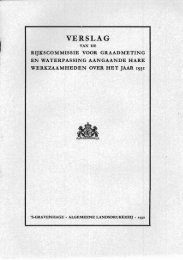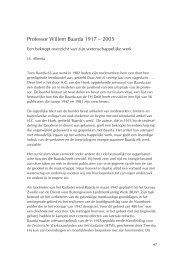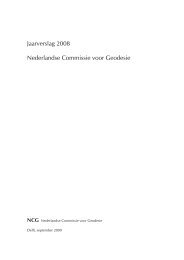SDI Convergence - Nederlandse Commissie voor Geodesie - KNAW
SDI Convergence - Nederlandse Commissie voor Geodesie - KNAW
SDI Convergence - Nederlandse Commissie voor Geodesie - KNAW
You also want an ePaper? Increase the reach of your titles
YUMPU automatically turns print PDFs into web optimized ePapers that Google loves.
for these needs by increasing the quantity and quality of public services as well as tailoring<br />
these to the desires of the individual client. Government uses ICT as a tool to act<br />
in favour of citizens. At the same time, Soft Sister appears to be a different presentation<br />
of Big Brother.<br />
When we use government services, there is no option to choose a different service<br />
provider. Moreover, usually we cannot withdraw from using government service because<br />
it is obligatory by law. In the Netherlands, for example, all citizens above the age<br />
of fourteen must, when asked by a police officer, identify themselves with an official<br />
identification document. In order to comply with this duty, Dutch citizens are obliged to<br />
use a government service to provide them with documents like passports or ID-cards.<br />
We are not clients of government in the same sense as being customers of private enterprises,<br />
because we are not free to choose whether we want to use a service or who<br />
we want to enjoy the service from. Consequently, we are always both subjects and<br />
clients of the state at the same time. Therefore, a holistic perspective in both research<br />
and practice of information-intensive government is highly desirable (Taylor et al.,<br />
2009).<br />
2.2 The conscience of technology<br />
The three citizen roles of subject, citoyen and client each emphasise different aspects<br />
of citizenship which are all important for governance in a democratic society. The three<br />
scenarios of Orwell, Athens and Soft Sister are extreme positions, which show the conflicting<br />
values government has to deal with when using ICT in interactions with citizens.<br />
Government ought to respect all three citizen roles and address citizens as such. However,<br />
we cannot count on technology itself to make the proper judgement and adapt its<br />
functionalities to the context it is used in. In other words, citing Davis (2003, in Michael<br />
et al., 2008), “technology has no conscience of its own”. This does not imply, however,<br />
that technology would be a neutral tool, serving as a mere means to reach governmental<br />
goals. We would rather state that the characteristics of a particular technology convey<br />
an inherent logic which ought to be taken into account when applying it in interactions<br />
with citizens. What then, is the inherent logic of location-based services? This<br />
question will be explored in the next section by discussing three applications of LBS in<br />
Dutch public administration. We will demonstrate that despite the different underlying<br />
technologies, a similar pattern can be distinguished revealing the inherent logic of LBS.<br />
3. LOCATION-BASED SERVICES IN DUTCH PUBLIC ADMINISTRATION<br />
3.1 Three cases of LBS in Dutch public policy<br />
3.1.1 Satellite technology for road pricing<br />
In December 2007, the Dutch Ministry of Transport, Public Works and Water Management<br />
announced the Cabinet’s decision to implement a new pricing system for the use<br />
of public roads (Ministerie van Verkeer en Waterstaat, 2007). According to the plan, by<br />
2012, car drivers will be charged a price per kilometre. To implement this new system,<br />
the Dutch government will be using the latest satellite technology to collect location<br />
information about every car. Even though the legal, political and technological specifications<br />
have not yet been entirely determined, it is evident that the gathered location<br />
information will need to be connected to personal data in order to be able to send the<br />
right bill to the right person. Of course, the underlying report mentions that considerations<br />
about people’s privacy will be taken into account when developing the system.<br />
Already, a private company has offered the responsible Minister a technological solu-<br />
77

















